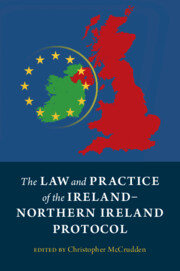Acknowledgements
The origins of this book may be traced back to the good judgment of John Temple Lang and Brian Doherty in suggesting that a series of legal seminars should be organised on the implications for the island of Ireland of the Withdrawal Agreement (especially the Protocol) and the Trade and Cooperation Agreement for the Irish Centre on European Law (ICEL) of Trinity College Dublin. I was delighted to be asked to organise these, together with Stephen Brittain, the Director of the Centre. These took place, in collaboration with the School of Law at Queen’s University Belfast, during the months of November and December 2020, and then in March 2021, via teleconference. These seminars attracted a significant audience, including many legal practitioners, public officials of several governments, and members of the judiciary from Ireland and Northern Ireland.
Coincidentally, as a member of the Northern Ireland Judicial Studies Board (JSB), I proposed and then organised, in close collaboration with Sir Bernard McCloskey and Terence Dunlop, respectively the Chair and Secretary of the Board, a separate series of in-house, Chatham House Rule seminars for all tiers of the Northern Ireland judiciary on the implication of the Protocol for their work. These were conducted online between January and June 2021. The enthusiastic support of the then Lord Chief Justice of Northern Ireland, Sir Declan Morgan, was critical to the success of these judicial seminars and I thank him for his support throughout the project, for his insightful contributions to the discussions, and for generously providing the Preface to this volume.
The greater proportion of the chapters in this book grew out of one or other of the ICEL and JSB seminars, and in several cases, both. Those who participated in the seminars often asked challenging questions and stimulated useful discussion. Those contributing papers were able to draw on these when they revised their papers into chapters for the book. Sincere thanks are due to Sir Bernard, Stephen Brittain, Terence Dunlop and his team, and all those who attended these seminars.
More than most books, this has been a collaborative effort by all the contributors. My most profound thanks go to all those who spoke at the seminars and have contributed chapters. Some chapters were specially commissioned, following the seminars on the basis of helpful suggestions from seminar participants as to what it would be useful for the book to include, and I am particularly grateful to those who stepped in at this stage. All authors contributed to the project with enthusiasm, but under considerable pressure. They all responded magnificently even under the constant bombardment of my interminable reminders, which they received with good grace. Despite this pressure, all have managed to produce authoritative yet readable contributions, on-time and within tight word limits.
Several different methods of quality control operated. Three anonymous reviewers swiftly supported publication and made suggestions for revisions and for additional chapters, all of which were gratefully received and acted on. Each draft chapter was reviewed by at least two other contributors and the suggestions that arose from this peer-review process have added significantly to the quality of the final product, not least in drawing out the many connections between chapters. John Temple Lang, who was not only present at the birth of the project and stayed with it throughout, was an important source of advice as it developed. He also read the complete draft manuscript and, based on his immense experience of EU law, made many important suggestions for improvements and corrections, for which I am enormously grateful.
Cambridge University Press has been a pleasure to work with. The process began with my initial contact with the legendary law editor at the Press, Finola O’Sullivan, just before she retired. Her sage advice, together with the efficiency of Marianne Nield who took over after Finola retired, enabled a swift agreement with the Press to be concluded, not only to publish the book but to do so on an accelerated timetable. Vidya Ashwin managed production with aplomb from the manuscript to the final print-ready files. Lori Heaford assiduously copy-edited the entire manuscript. The extensive index was prepared by Carol Bailey. Becky Jackaman was Senior Content Manager. I am grateful to all for their efficiency and unfailing helpfulness.
ICEL and the School of Law at Queen’s generously agreed to fund gold open access which means that the book will be free to access in perpetuity. I am most grateful to both institutions for their support.
Several contributors have asked that their thanks be recorded for assistance in the writing of their chapters. Gavin Barrett thanks Judge Max Barrett for drawing his attention to some useful source materials for this chapter. Imelda Maher thanks Margaret Gallagher for research assistance. Catherine Donnelly thanks Hugh O’Donnell BL for assistance. Mary Dobbs and Viviane Gravey thank, in particular, Ludivine Petetin, Katy Hayward, Billy Melo Araujo, Dagmar Schiek, David Phinnemore and everyone in the Brexit and Environment network for their ongoing valuable insights and support, as well as Christopher McCrudden and Gemma Davies for their feedback on earlier drafts of their chapter. Gemma Davies thanks the members of the UK–Irish Criminal Justice Cooperation Network. David Fennelly thanks Catherine Donnelly and John Temple Lang for comments on a draft of his chapter.
Finally, I hope a more personal note of thanks and appreciation is not out of place. This book began life during the Covid-19 pandemic and most of the stages of preparation and production took place during restrictions of one sort or another. All contributors depended on loved ones for support throughout these difficult times. I particularly want to record my love, admiration and gratitude to Caroline, my wife and the mother of our children, not only for her selfless support and unlimited tolerance during Brexit, Covid and the production of this book, but throughout our life together, first in Oxford and then in Northern Ireland. Thank you.

